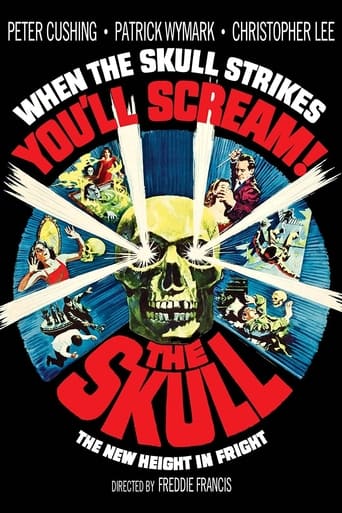Woodyanders
Occult object collector Dr. Christopher Maitland (the always excellent Peter Cushing) gets his hands on the skull of the infamous Marquis de Sade. However, said skull turns out to be possessed by an evil spirit which wreaks all kinds of deadly havoc.Director Freddie Francis, working from a compact and compelling script by Milton Subotsky, relates the engrossing story at a steady pace, does an expert job of crafting a spooky ooaga-booga Gothic atmosphere (a bravura nightmare set piece with the police arresting Maitland and forcing him to play Russian Roulette hits the shuddery spot something fierce), and pulls out the stirring stops for the lively and nearly wordless white-knuckle climax that's capped off by a satisfyingly grim surprise ending. The fine acting by an ace cast of top British thespians rates as another substantial asset: Christopher Lee as gloomy fellow collector Sir Matthew Phillips, Patrick Wymark as sleazy antiques dealer Marco, Jill Bennett as Maitland's concerned wife Jane, Nigel Green as the hard-nosed Inspector Wilson, Peter Woodthorpe as pesky landlord Travers, Patrick Magee as a perplexed coroner, and Michael Gough as an auctioneer. John Wilcox's crisp widescreen cinematography boasts several nifty skull POV shots. The spirited shivery score by Elisabeth Lutyens does the spine-tingling trick. A worthwhile fright feature.
Angel Croitor
Freddie Francis directs an Amicus Production horror that has all the elegance and mood of a modern Gothic tale. Based off of Robert Bloch's story titled 'The Skull of the Marquis de Sade' the film follows an Occult Researcher (played by Peter Cushing) who crosses paths with a particular item of interest from a "mutual" friend of his, and Christopher Lee's, who sells him rare artifacts of the strange and wonderful. This particular item is the skull of the marquis de Sade and it comes with a terrifying back story of possession and madness that soon begins to add another story to the curse's legendary reputation. The film is a great execution of all the aspects that make cinema the powerful medium it is. The shot styles, the lighting, the set dressing, the music, and the performances are one of a kind. Horror buffs will be delighted with Francis' wonderful direction that truly upholds the 'show don't tell' ethos of film. Albeit it is a bit of a slow-burner and there isn't much subtext to walk away with. If anything it's a great little morsel to satisfy any cravings you may have for an old school horror that sets the mood for a dark and stormy night at home.
Coventry
"The Skull" definitely isn't on par with the other contemporary Peter Cushing and Christopher Lee pairings, from Hammer or Amicus or whatever other production studios, but it nevertheless remains an interesting and worthwhile slice of 60's Brit-horror. Freddie Francis was always one of the most gifted horror directors in Britain and provides the film with a continuously gloomy and sinister atmosphere. Moreover, he was an even more gifted cinematographer and assures a large number of inventive shots (like, for example, a point of view from inside the skull), while the always reliable Peter Cushing gives away a marvelous lead performance. However, the film specifically struggles with two major shortcomings, namely a) the fact that the script is based on a short story (by Robert Bloch) and it's not exactly fit for a long-feature film and b) the absence of an actual evil villain/monster of flesh and blood. Cushing depicts an avid collector of occult objects who obtains – illegally – the skull of the one and only Marquis de Sade. Fellow collector and former owner of the skull Christopher Lee attempts to warn his colleague about the mysterious and psychedelic forces homing inside the Marquis' skull, but naturally he doesn't listen. During the first two nights of the next new moon, however, he dramatically learns that the skull turns its owner into a helpless murder-committing marionette. I haven't read Bloch's short story, but I presume something went wrong during the processing into a movie screenplay, as there a few too many dull moments and a lack of clarity regarding the skull's incredible powers. The intro, a certain dream sequence and a few flashbacks are extraordinary (what is it with the English and foggy cemeteries). The climax is rather silly instead of frightening, with the skull floating around with the help of clearly noticeable strings as well as grotesque camera gestures and color patterns. Cushing and Lee obviously steal the show, but keep also an eye open for two genuine British cult heroes in minuscule roles: Michael Gough ("Horror Hospital") and Patrick Magee ("A Clockwork Orange").
catfish-er
Throughout the mid 60s and early 70s Amicus Productions churned out a series of wonderful little horror anthologies including: Dr. Terror's House of Horrors, Torture Garden, The House That Dripped Blood, Asylum, The Vault of Horror, From Beyond the Grave, and Tales from the Crypt.Unlike those movies, THE SKULL is not an anthology. Instead, it is a superb exception! Six minutes in; and, we've already gotten the back story, even before the titles roll! The opening is set in the early-19th century. We see a graveyard, with the requisite grave robbers; and, their client, a doctor (albeit a phrenologist).Peter Cushing plays Dr. Christopher Maitland, an occult researcher and collector who comes into possession of the skull by way of a suspicious dealer in such objects. Christopher Lee portrays Sir Matthew Phillips, a friend of Dr. Maitland; and, coincidentally a former owner of the skull! THE SKULL details the ghastly misfortunes that befall each successive owner of the skull. That is the skull of the infamous Marquis De Sade. According to the story, the Marquis De Sade was not insane, as many believed; but, was possessed by an evil spirit. And, that spirit still dwells in the skull.Moving from the literal form seamlessly into dreams and fantasies, THE SKULL is a marvelous example of modern, psychological horror. It was years ahead of its time.




